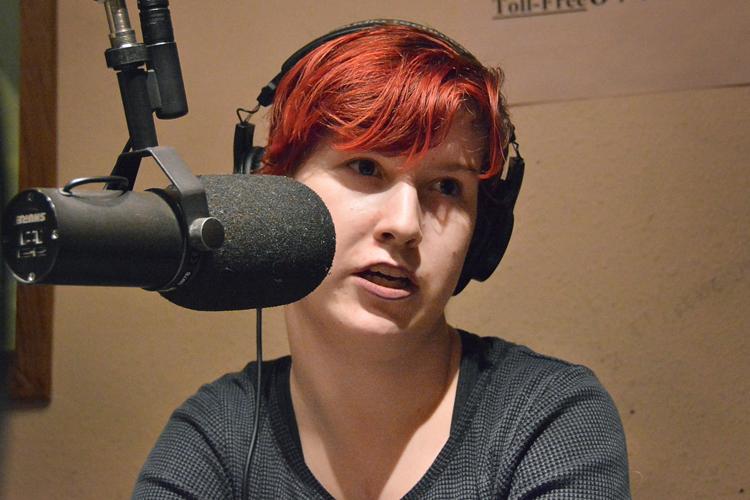
Gloria Trujillo starts her fifth-period Spanish class at 8:15 a.m. sharp. On this particular day, she is on a mission: make her class the inclusive environment she has always envisioned for the world.
She positions herself at the front of the room and opens up about her personal experiences with gender identity. Tears well up in her eyes as she talks about her childhood as a tomboy and never quite fitting into gender norms. Students sit in silence, as many have never addressed anything past verb conjugations and vocabulary in a Spanish class before.
Trujillo holds a confident smile, inhales and tells the class, “Soy una persona.” Translated in English: “I am a person.” She makes her message clear from the start. Gender doesn’t define who she is.
Trujillo wants her classroom to be an inclusive space for her students no matter how they identify – so she’s learning to work around the gender specifics that exist within the Spanish language. While society is often restricted to male and female pronouns, Trujillo feels it’s important for students of all gender identities to have a space to listen and be heard.
Even as a first-year staff member at Grant, Trujillo strives to address a range of issues in her class, from student-led discussions on police brutality to introducing alternative terminology like “Latinx” – a term used to include gender non-binary people in the Spanish language. There’s nothing Trujillo shies away from.
As a child growing up in Spain, Trujillo was a self-proclaimed tomboy and struggled to be accepted by her peers. In a society that shamed those who didn’t fit specific cultural roles, Trujillo didn’t feel comfortable with her gender identity.
Now at Grant, she wants to make sure that her students never experience the insecurities she grew up with by bringing a new perspective to teaching Spanish.
“The classroom needs to be a safe space. They need to know that they can trust me,” says Trujillo. “What does it matter if you are born one gender, and you don’t feel like it, and then you switch? Let people experience who they are.”
. . .
Trujillo was born in Madrid, Spain on June 30, 1977 shortly after her single mother, Isabel Miller, immigrated from Colombia.
Employers were hesitant to hire Miller because she was an immigrant, so she was unable to sustain herself working as a teacher. This forced Trujillo and her mother to move from town-to-town during summer and Christmas, selling things like jewelry and scarves at town fairs. They made just enough money to get by.
Because of the constant search for the best market to sell their products, the two moved to eight different cities while living in Spain. During their travels, they slept in their car or in tents.
When her mother couldn’t bring her along, Trujillo stayed with her two aunts in Ibiza, an island off the eastern coast of Spain. Her aunts were the first lesbian couple that Trujillo knew personally, and they opened her up to a new world about gender and sexuality.
“They made the most impact on me,” says Trujillo. “Their values have trickled down to me. They are so important; they in so many ways shaped who I am today.”
“The second question that I hope we all start saying after ‘How are you?’ is ‘What pronoun do you prefer?’” – Gloria Trujillo
Since the family moved so much, it was hard for Trujillo to form a strong community or make any friends. She remembers that some kids didn’t like her because she always came from a different region of Spain.
She often had someone bullying her at school, usually boys. “They actually hurt me lot,” she says, recalling a time that one boy pushed her off her bike when she was leaving school. “I came home with a bloody lip and a broken front tooth.”
On top of that, Trujillo grew up wanting to look like a boy, although she still identified as a girl. She was tired of the stark contrast in expectations between girls and boys. Most of her friends and family expected her to play with dolls and do house chores, while boys could go outside and play sports.
“Girls were supposed to be very feminine, and boys were supposed to be very masculine,” says Trujillo. “My mom was mortified that I wanted to have and keep my hair short because she wanted to have a girly girl, and I was a tomboy from the start.”
Trujillo would give her mother excuses to ensure that she wouldn’t have to go to school because she was so worried about being picked on. “I would say, ‘My hair is sore. I can’t go to school.’ That was one of my best. You have experiences when you are very young that shape who you are and make you like school or dislike school.”
Through all of the bullying, Trujillo recalls the majority of her teachers being supportive of her. “If there was anyone that made my transition from school to school better, it was them,” she says.
After graduating high school, she moved to Colombia with her mother for six months to go back to her roots. While there, she noticed the same gender pressures that she was exposed to in Spain.
“We are people of the world. We still need to connect with people, and also, we need to belong” – Gloria Trujillo
She recalls Colombian society expecting women to wear makeup more than in Spain. “I came … dressing like a boy, so if you looked at me you could say, ‘Are you a boy or a girl?’”
When she returned to Spain, she worked for a mechanic in an office ordering parts – a rare field of work for women at the time. But after she began struggling to pay rent, Trujillo felt she needed to make a change.
She decided to move in with someone who happened to be from Ireland. Conversing with him for the next 6 months greatly improved her English skills, a contrast from when she was in high school and struggled with her English classes.
Trujillo moved to the United States in 2001. She felt welcomed there. “Going to a country and feeling welcome makes you feel … that you belong,” she says. “It makes you feel part of the world, and I think that’s important.”

Her mother had moved to Portland, Oregon in 1998, and Trujillo decided to follow so the two could be closer together. It would mean learning a whole new culture, but she didn’t let that scare her.
“We live in a globalized society; it’s unavoidable to experience different cultures,” she says. “It’s important to have cultural awareness.”
She attended Portland State University and earned a bachelor’s degree in Spanish in 2014. She then taught Spanish at PSU and earned a master’s at the same time, completing graduate school last summer.
Trujillo realized that becoming a teacher was the best way to empower students to be more proactive and work toward change. She started at Grant in August.
“Teaching at PSU, I realized that there’s a lot of ideology in language,” she says. “Working at Grant, I want my students to discover what Spanish is like for themselves and make a comfortable space for them to be themselves.”
She uses her experiences of feeling excluded throughout her childhood to bring an inclusive lens into her classroom. “We are people of the world,” she says. “We still need to connect with people, and also, we need to belong.”

“Hopefully by being here, by bringing my experiences by also opening up a space for conversations, (students) can start looking at what’s happening in our community and hopefully changing our society,” she says.
Trujillo is the only native speaker in the Spanish department at Grant. That’s something that principal Carol Campbell sees as a benefit.
“Being a native speaker is definitely something that we appreciate to not only create diversity but to share her lived experience and perspective that’s different than the majority of the Grant staff,” Campbell says.
Fellow Spanish teacher Colin Oriard believes the way Trujillo interacts with students perfectly embodies the inclusivity and education that students should receive. “A lot of the social injustices in our country stem from ignorance,” Oriard says. “So I think that it’s our responsibility as teachers to push that education piece a little bit further, and I think Gloria is conscious about that.”
Grant freshman Annalise Johnson, who identifies as gender non-binary and uses they/them pronouns, quit taking Spanish class last year because the class didn’t include non-binary pronouns. “I felt … invisible and that I shouldn’t belong in that culture because I didn’t belong in the language,” says Johnson.
Johnson recently came to Trujillo to seek a way around the linguistic issue. “Talking with Gloria, I got to see that there (are) opportunities to continue getting exposed to new cultures and learning the language without having to just use binary pronouns,” Johnson says.

Trujillo hopes all teachers, staff and students start to put gender inclusivity at the forefront. “The second question that I hope we all start saying after ‘How are you?’ is ‘What pronoun do you prefer?’ because we assume,” she says. “And I don’t think that it’s OK anymore that we assume.”
In order to create a stronger Spanish-speaking community within Grant, Trujillo looks forward to helping build the weekly, student-run Spanish Club held in her room during lunch. She also plans to organize a support group at Grant for Latinx students and staff.
Trujillo believes all educators need to take their work a step further.
“Language is a community,” says Trujillo. “Not everyone has to like me. But in my classroom, I’m hoping that everybody feels welcome. It’s more than just gender equality, reaching out to different minorities, enabling their voice. My vision is that it’s their class. It’s for them. I’m just here to try to make it easier for them if I can, using what skills they already have.” ◆































